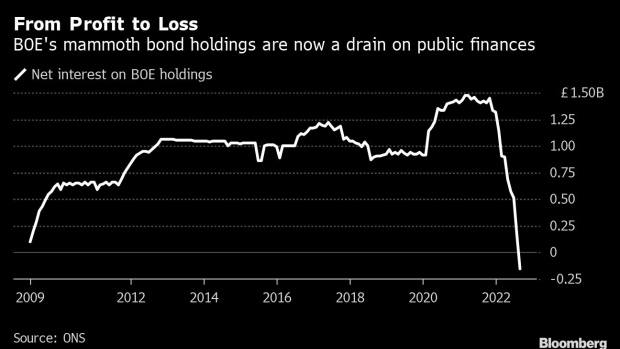Nov 11, 2022
UK’s Fiscal Hole Deepens on Osborne’s Decade-Old Accounting Ploy
, Bloomberg News

(Bloomberg) -- A canny accounting move by former UK chancellor George Osborne that reaped £120 billion in profits for the government is now turning sour and risks growing the fiscal hole challenging his successors.
A decade ago this week, Osborne declared that income from bonds the Bank of England acquired under its quantitative-easing program could be used to reduce government debt. That was a boon when he was trying to shrink the country’s deficit under the austerity imposed after the financial crisis.
The deal struck with the BOE meant the government, while benefiting from payments at the time, would also have to foot the bill for any losses in the future.
Now, after steep interest-rate hikes and policy turmoil that have battered the gilt market, the government expects to send £11 billion ($12.8 billion) to the central bank to cover an anticipated shortfall on the portfolio in the months to April.
It’s unfortunate timing. Current Chancellor Jeremy Hunt wants to plug a £50 billion hole in the budget, probably through painful spending cuts and tax increases, for an announcement due next week. Yet the BOE’s policy of hiking borrowing costs and selling its bond holdings back to the market is exacerbating the government’s losses.
“The blurring of lines between monetary and fiscal policies has not been helpful to the setting of either branch of policy,” said Jagjit Chadha, director of the National Institute of Economic and Social Research. “It would have been better to have kept the proceeds of this carry trade in a separate financial vehicle.”
The income from the BOE’s bond holdings was previously held in a segregated pot inaccessible to the Treasury. The switch from profits to losses for the Conservative government started this year.
UK Treasury to Transfer £11 Billion to BOE to Cover QE Losses
As the BOE’s key rate climbed -- at 3% now compared to 0.1% a year ago -- the cost of funding the bond portfolio exceeded the coupon income. Added to that, the BOE has just started to sell down its debt holdings at a lower price than it paid. The unrealized shortfall for the total QE assets amounted to around $200 billion last month.
“The scenario is largely foreseen -- it just happened way too quickly!” said Trevor Pugh, head of gilt interdealer broker and agency desks at Tradition Ltd.
Back to Future
The vast transfers may appear odd to those not familiar with the intricacies of UK finances. After all, the BOE is fully owned by the government. But the two institutions operate independently. At the time, the move was controversial, with then-BOE Governor Mervyn King telling Osborne it “makes sense” but the opposition Labour party called it “smoke and mirrors.”
It’s an issue likely to be in focus in Downing Street, with Hunt having recruited Osborne’s former chief of staff Rupert Harrison for a newly-created panel of experts. Prime Minister Rishi Sunak also met with Osborne last month to discuss the autumn budget.
Read more: Trapped by Markets and Voters, Sunak Faces ‘Impossible’ Budget
It may turn out to have been cheaper for Osborne to have borrowed more back then rather than to delay the cost to the present. The Office for Budget Responsibility, a public finances watchdog, noted at the time that future costs might outweigh the benefit.
Coupon income on the gilt holdings at the asset purchase facility -- a subsidiary company for conducting the quantitative easing -- is around £16 billion per year. Meanwhile, the annualized cost of the BOE’s loan to the APF is currently about £25 billion. If interest rates rise to around 4.5% next year, as money markets suggest, that will swell past £35 billion.
The BOE began selling gilts from its main QE facility earlier this month, crystallizing around £350 million in losses so far. There are also £19 billion in long-maturity and inflation-linked bonds from its recent financial-stability operation, which it plans to start offloading from Nov. 29. Those sales may realize a profit as the bonds were generally bought at cheaper prices than current rates, offsetting some of the QE losses.
Central banks differ in how they handle such issues. The US Treasury, for example, will not need to cover losses made by the Federal Reserve. Under the Fed’s accounting methodology, it just pauses payments to the Treasury until earnings are such that the loss can be covered -- creating a so-called “deferred asset.”
“The BOE could potentially do the same as the Fed, although communication would be important,” said Pugh.
--With assistance from David Goodman and Julius Domoney.
(Updates with details on Osborne meeting Sunak.)
©2022 Bloomberg L.P.





